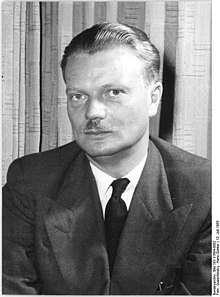Bolesław Piasecki
Bolesław Piasecki | |
|---|---|
 | |
| Leader of the Falanga National Radical Camp | |
| In office 1935–1939 | |
| Leader of PAX Association | |
| In office 1947–1979 | |
| Succeeded by | Ryszard Reiff |
| Personal details | |
| Born | 18 February 1915 Łódź, Congress Poland, Russian Empire |
| Died | 1 January 1979 (aged 63) Warsaw, Poland |
| Alma mater | University of Warsaw |
| Military service | |
| Nickname(s) | Leon Całka, Wojciech z Królewca, Sablewski |
| Years of service | 1939–1945 |
| Rank | Lieutenant |
| Unit | Confederation of Nation, Home Army |
| Battles/wars | World War II |
Bolesław Bogdan Piasecki, alias Leon Całka, Wojciech z Królewca, Sablewski (18 February 1915 – 1 January 1979) was a Polish politician and writer.
Biography[]
In interwar Poland he was one of the more prominent nationalist politicians, playing an important role in the leadership of Obóz Narodowo-Radykalny. In 1934 he was interned in Bereza Kartuska. After his release, he became the leader of the illegal, extreme right faction ONR-Falanga. This organisation advocated "Catholic totalitarianism" and is considered by many to have been a fascist movement.
During the Second World War he fought the Nazis as a member of the Polish Underground, leading the grouping Konfederacja Narodu (merged into the Armia Krajowa in 1943) and taking part in the fighting around Vilnius. Afterwards, he was arrested by the Soviet NKVD, and in a drastic conversion from his previous stance began to cooperate with the Communist government in Poland.[1]
After the war, in 1945, he co-founded and directed a so-called social progressive movement of lay Catholics, grouped around the weekly publication "" (Today and Tomorrow). In 1947 he created the PAX Association and was the chairman of its governing body (until his death). After 1956, the importance of PAX diminished (and Piasecki's role along with it), though it remained a prominent organisation until 1989 and its successors still exist today.
| Part of a series on |
| Falangism |
|---|
 Yoke and arrows |
|
In later years, Piasecki was a member of the Polish Sejm from 1965, where he presided over the grouping of members associated with PAX. In 1971-1979 he was a member of the Polish Council of State.
Honours and awards[]
- Silver Cross of the Virtuti Militari (1944)
- Commander's Cross with Star of the Order of Polonia Restituta (1964), previously awarded the Commander's Cross (1955)
- Order of the Banner of Work, 1st Class (1969)
References[]
Further reading[]
- Mikołaj Kunicki (2005). "The Red and the Brown: Boleslaw Piasecki, the Polish Communists, and the Anti-Zionist Campaign in Poland, 1967-68". East European Politics & Societies 19 (2): pp. 185–225.
- Dudek, Antoni/Pytel, Grzegorz (1990). Bolesław Piasecki. Próba biografii politycznej (Wstęp Jan Józef Lipski). Londyn: . ISBN 0-906601-74-6.
- 1915 births
- 1979 deaths
- Politicians from Łódź
- Polish Roman Catholics
- Camp of Great Poland politicians
- Falangists
- PAX Association members
- Members of the Polish Sejm 1965–1969
- Members of the Polish Sejm 1969–1972
- Members of the Polish Sejm 1972–1976
- Members of the Polish Sejm 1976–1980
- Polish military personnel of World War II
- Home Army officers
- University of Warsaw alumni
- Recipients of the Silver Cross of the Virtuti Militari
- Commanders with Star of the Order of Polonia Restituta
- Recipients of the Order of Polonia Restituta (1944–1989)
- Recipients of the Order of the Banner of Work
- National Radical Camp politicians